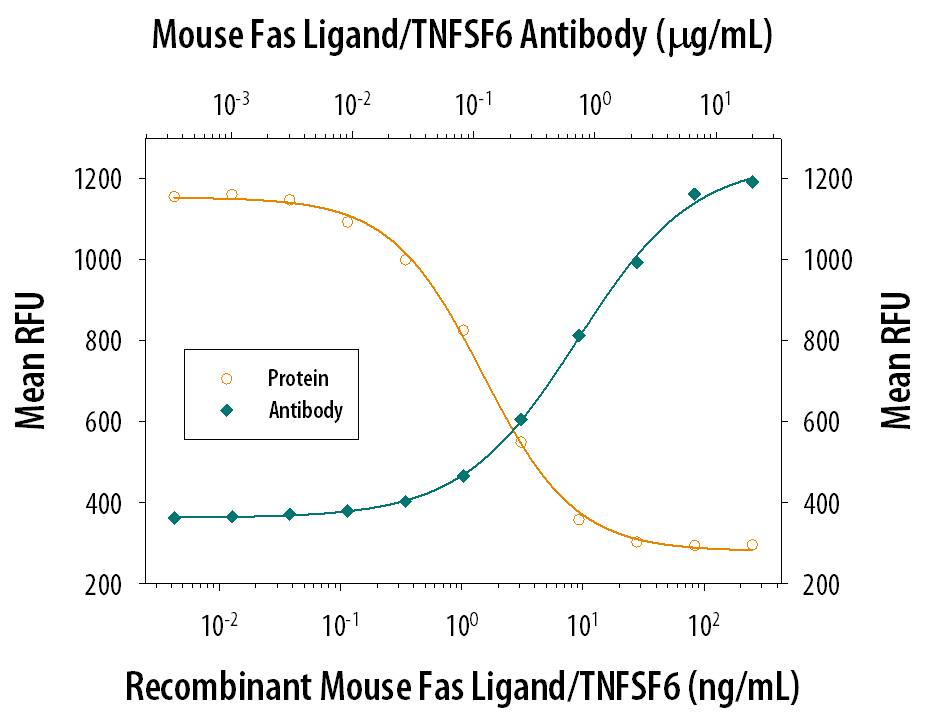Mouse Fas Ligand/TNFSF6 Antibody
R&D Systems, part of Bio-Techne | Catalog # AF526


Key Product Details
Species Reactivity
Validated:
Cited:
Applications
Validated:
Cited:
Label
Antibody Source
Product Specifications
Immunogen
Pro132-Leu279
Accession # Q544E9
Specificity
Clonality
Host
Isotype
Endotoxin Level
Scientific Data Images for Mouse Fas Ligand/TNFSF6 Antibody
Cytotoxicity Induced by Fas Ligand/TNFSF6 and Neutralization by Mouse Fas Ligand/TNFSF6 Antibody.
In the presence of a cross-linking antibody, mouse anti-HA Monoclonal Antibody, Recombinant Mouse Fas Ligand/TNFSF6 (Catalog # 6128-SA) induces cytotoxicity in the Jurkat human acute T cell leukemia cell line in a dose-dependent manner (orange line). Under these conditions, cytotoxicity elicited by Recombinant Mouse Fas Ligand/TNFSF6 (10 ng/mL) is neutralized (green line) by increasing concen-trations of Goat Anti-Mouse Fas Ligand/ TNFSF6 Antigen Affinity-purified Polyclonal Antibody (Catalog # AF526). The ND50 is typically 0.125-0.75 µg/mL.Applications for Mouse Fas Ligand/TNFSF6 Antibody
Western Blot
Sample: Recombinant Mouse Fas Ligand/TNFSF6 (Catalog # 526-SA)
Neutralization
Formulation, Preparation, and Storage
Purification
Reconstitution
Formulation
Shipping
Stability & Storage
- 12 months from date of receipt, -20 to -70 °C as supplied.
- 1 month, 2 to 8 °C under sterile conditions after reconstitution.
- 6 months, -20 to -70 °C under sterile conditions after reconstitution.
Background: Fas Ligand/TNFSF6
Fas ligand (FasL) is a 40 kDa type II membrane protein belonging to the TNF family. In the new TNF super family nomenclature, FasL is referred to as TNFSF6. The specific receptor for FasL is Fas (CD95, Apo-1), a 45 kDa type I transmembrane protein that is a member of the TNF receptor family. FasL is predominantly expressed on activated T cells and NK cells, while Fas is expressed on various types of cells. The Fas/FasL system plays a crucial role in modulating immune response by inducing cell apoptosis to maintain homeostasis, self-tolerance of lymphocytes, and immune privilege. FasL was reported to be a potent chemoattractant for neutrophils, suggesting a novel proinflammatory function of this molecule. Like other members of the TNF family, the membrane-bound FasL can be cleaved by metalloproteinase to generate the soluble Fas ligand (sFasL) which is mainly a non-covalently linked homotrimer. It has been shown that the membrane-bound TNF‑ alpha and FasL are primary activators of their receptors. In contrast to soluble TNF‑ alpha which has potent cytotoxicity, sFasL is much less cytotoxic. Studies have shown that sFasL may competitively inhibit the killing effect of membrane FasL indicating that the cleaving of membrane FasL might be a mechanism to down‑regulate their activities.
References
- Suda, T. et al. (1993) Cell 75:1169.
- Kägi, D. et al. (1994) Science 265:528.
- Schneider, P. et al. (1998) J. Exp. Med. 187:1205.
- Seino, K. et al. (1998) J. Immunol. 161:4484.
Alternate Names
Gene Symbol
UniProt
Additional Fas Ligand/TNFSF6 Products
Product Documents for Mouse Fas Ligand/TNFSF6 Antibody
Product Specific Notices for Mouse Fas Ligand/TNFSF6 Antibody
For research use only